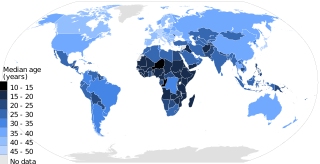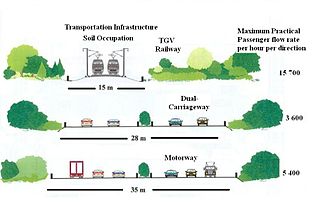
The demographics of Singapore include the population statistics of Singapore such as population density, ethnicity, education level, health of the populace, economic status, religious affiliations and other demographic data of the population.

Smart growth is an urban planning and transportation theory that concentrates growth in compact walkable urban centers to avoid sprawl. It also advocates compact, transit-oriented, walkable, bicycle-friendly land use, including neighborhood schools, complete streets, and mixed-use development with a range of housing choices. The term "smart growth" is particularly used in North America. In Europe and particularly the UK, the terms "compact city", "urban densification" or "urban intensification" have often been used to describe similar concepts, which have influenced government planning policies in the UK, the Netherlands and several other European countries.

Human population planning is the practice of intentionally controlling the growth rate of a human population. The practice, traditionally referred to as population control, had historically been implemented mainly with the goal of increasing population growth, though from the 1950s to the 1980s, concerns about overpopulation and its effects on poverty, the environment and political stability led to efforts to reduce population growth rates in many countries. More recently, however, several countries such as China, Japan, South Korea, Russia, Iran, Italy, Spain, Finland, Hungary and Estonia have begun efforts to boost birth rates once again, generally as a response to looming demographic crises.

Ecotourism is a form of tourism involving responsible travel to natural areas, conserving the environment, and improving the well-being of the local people. Its purpose may be to educate the traveler, to provide funds for ecological conservation, to directly benefit the economic development and political empowerment of local communities, or to foster respect for different cultures and for human rights. Since the 1980s, ecotourism has been considered a critical endeavor by environmentalists, so that future generations may experience destinations relatively untouched by human intervention. Ecotourism may focus on educating travelers on local environments and natural surroundings with an eye to ecological conservation. Some include in the definition of ecotourism the effort to produce economic opportunities that make conservation of natural resources financially possible.

The birth rate for a given period is the total number of live human births per 1,000 population divided by the length of the period in years. The number of live births is normally taken from a universal registration system for births; population counts from a census, and estimation through specialized demographic techniques. The birth rate is used to calculate population growth. The estimated average population may be taken as the mid-year population.

Sub-replacement fertility is a total fertility rate (TFR) that leads to each new generation being less populous than the older, previous one in a given area. The United Nations Population Division defines sub-replacement fertility as any rate below approximately 2.1 children born per woman of childbearing age, but the threshold can be as high as 3.4 in some developing countries because of higher mortality rates. Taken globally, the total fertility rate at replacement was 2.33 children per woman in 2003. This can be "translated" as 2 children per woman to replace the parents, plus a "third of a child" to make up for the higher probability of males born and mortality prior to the end of a person's fertile life. In 2020, the average global fertility rate was around 2.4 children born per woman.
A population decline in humans is a reduction in a human population size. Over the long term, stretching from prehistory to the present, Earth's total human population has continued to grow; however, current projections suggest that this long-term trend of steady population growth may be coming to an end.

Population ageing is an increasing median age in a population because of declining fertility rates and rising life expectancy. Most countries have rising life expectancy and an ageing population, trends that emerged first in developed countries but are now seen in virtually all developing countries. That is the case for every country in the world except the 18 countries designated as "demographic outliers" by the United Nations. The aged population is currently at its highest level in human history. The UN predicts the rate of population ageing in the 21st century will exceed that of the previous century. The number of people aged 60 years and over has tripled since 1950 and reached 600 million in 2000 and surpassed 700 million in 2006. It is projected that the combined senior and geriatric population will reach 2.1 billion by 2050. Countries vary significantly in terms of the degree and pace of ageing, and the UN expects populations that began ageing later will have less time to adapt to its implications.

The Australian continent was first settled when ancestors of Indigenous Australians arrived via the islands of Maritime Southeast Asia and New Guinea over 50,000 years ago.
The immigration history of Australia began with the initial human migration to the continent around 80,000 years ago when the ancestors of Aboriginal Australians arrived on the continent via the islands of Maritime Southeast Asia and New Guinea. From the early 17th century onwards, the continent experienced the first coastal landings and exploration by European explorers. Permanent European settlement began in 1788 with the establishment of a British penal colony in New South Wales. From early federation in 1901, Australia maintained the White Australia Policy, which was abolished after World War II, heralding the modern era of multiculturalism in Australia. From the late 1970s there was a significant increase in immigration from Asian and other non-European countries.

Sustainable urban infrastructure expands on the concept of urban infrastructure by adding the sustainability element with the expectation of improved and more resilient urban development. In the construction and physical and organizational structures that enable cities to function, sustainability also aims to meet the needs of the present generation without compromising the capabilities of the future generations.
Natalism is a belief that promotes the reproduction of human life. The term comes from the Latin adjective for 'birth', nātālis.

MigrationWatch UK is a British think-tank and campaign group which argues for lower immigration into the United Kingdom. Founded in 2001, the group believes that international migration places undue demand on limited resources and that the current level of immigration is not sustainable.
Opposition to immigration, also known as anti-immigration, has become a significant political ideology in many countries. In the modern sense, immigration refers to the entry of people from one state or territory into another state or territory in which they are not citizens. Illegal immigration occurs when people immigrate to a country without having official permission to do so. Opposition to immigration ranges from calls for various immigration reforms, to proposals to completely restrict immigration.
Ecologically sustainable development is the environmental component of sustainable development. It can be achieved partially through the use of the precautionary principle; if there are threats of serious or irreversible environmental damage, lack of full scientific certainty should not be used as a reason for postponing measures to prevent environmental degradation. Also important is the principle of intergenerational equity; the present generation should ensure that the health, diversity and productivity of the environment is maintained or enhanced for the benefit of future generations. In order for this movement to flourish, environmental factors should be more heavily weighed in the valuation of assets and services to provide more incentive for the conservation of biological diversity and ecological integrity.

In Demography, the rate of natural increase (RNI), also known as natural population change, is defined as the birth rate minus the death rate of a particular population, over a particular time period. It is typically expressed either as a number per 1,000 individuals in the population or as a percentage. RNI can be either positive or negative. It contrasts to total population change by ignoring net migration.
A baby bonus is a government payment to parents of a newborn baby or adopted child to assist with the costs of childrearing.
The Australian government has a policy and practice of detaining in immigration detention facilities non-citizens not holding a valid visa, suspected of visa violations, illegal entry or unauthorised arrival, and those subject to deportation and removal in immigration detention until a decision is made by the immigration authorities to grant a visa and release them into the community, or to repatriate them to their country of origin/passport. Persons in immigration detention may at any time opt to voluntarily leave Australia for their country of origin, or they may be deported or given a bridging or temporary visa.

The Sustainable Australia Party, formerly the Sustainable Population Party, is an Australian political party. Formed in 2010, it describes itself as being "from the political centre".

Population planning in Singapore spans two distinct phases: first to slow and reverse the boom in births that started after World War II; and second, from the 1980s onwards, to encourage parents to have more children because birth numbers had fallen below replacement levels.











